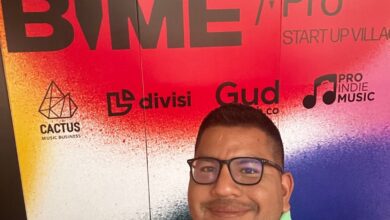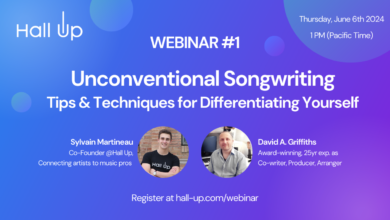Music (R)evolution: is Acceleration the Future of Music Innovation?

Over the past decades, the Music Industry went through more revolutions than Russia in the first half of the 20 h century. At the crossroad between innovation and creativity, musicians and producers were always keen to experiment with new ways of doing things. But from digital soundtracks to live stream music and media influencers, the internet forever changed how things work within the Industry. An ongoing revolution to which the Wallifornia Music Tech Festival pays tribute.
Let’s talk about tech baby
You don’t need much more than a guitar, some friends to play with and enthusiastic fans to start a band. But for a long time, you needed much more than that to have your favorite song recorded and broadcasted. From music studios to record retailers, the list of stakeholders was painstakingly
extensive. Not anymore. A keyboard and a reliable connection to the internet, that is all it takes to start producing and sharing your own music worldwide. An evolution that does not only concern hard core developers. I recently had a chat with Paul O’Brien, Mediatech Ventures’ CEO, “The entire foundation of the Media and Music industries is forever changed and demanding that we all keep pace with future change simply because the foundation is no longer a written contract signed in pen with a media company based in Los Angeles”. And that’s just the tip of the iceberg.
In the mind of most people, the marriage of music and technology equals downloading music or mixing songs on a laptop. But Musictech is about much more than music apps and marketplaces where you can download your favorite songs on your Smartphone. Imagine for a minute an algorithm that could connect your emotions to the music you are listening to. Or an online tracker that would help you with connecting with your audience and collecting your royalties properly? That is what we are talking about. “From new ways of doing music to supportive innovations for festival organizers or copyrights collection apps, Musictech gathers any business or solution that uses new technologies to have an innovative solution to an unresolved issue within the field of the Music Industry,” says Gérôme Vanherf, Director Manager at Wallifornia MusicTech Festival.
Of course, the Music Industry is not the only one shaken by the new technologies that arose with the digital era. But what makes it stand out is that it is by far one of the most permeable to it. A realization which led Vanherf to launch the Festival: “New technologies are everywhere nowadays, but not all sectors react to them in the same way. While some industries are very careful regarding how to include them in their strategy, music industry practitioners embrace them in a very lean way. They are the avant-garde, and this is why the sector is so thrilling.”
According to O’Brien, however, disruptive technologies may be both a blessing and a curse. They are neither a good nor a bad thing in themselves, but they definitely induce transformations: “Quite simply, you are either a part of that shift or you are left behind. Our industry, more than any other perhaps, is not just sensitive to that foundation but it depends on it – and learning how it works and how to leverage it means the difference between still playing gigs at your local bar vs. producing your own album and going on tour under your own volition.”
Computers do not listen to music. People do.
The least we can say is that the early stages of the internet era were no piece of cake for the music industry. While major companies had to reinvent their codes, billions of songs were illegally shared between users, therefore endangering labels by depriving them of their royalties. However, after years of going through a rough patch, the horizon seems to brighten up. The success of a company like Spotify provides a good example. With its service of an audio streaming platform fully accessible through paid subscription, the Swedish company was able to bring back a generation of users who lost the habit of paying to listen to songs, but that instead consider music as commodity, securing millions of users worldwide for its service. All that was made possible thanks to the use of the right technology applied to the right problem.
According to Gérome Vanherf, Musictech encompasses a broad variety of stakeholders from artists and labels to managers and security staff members.
“Basically, any innovation that facilitates music creation but also music distribution, sales, or new and improved ways of listening to music such as festivals, apps, or headphones can be counted as MusicTech”.
Yet it is not all about technology per se. “Sure, AI will replace most jobs at some point and blockchain will change the world, some day” adds O’Brien. “But let’s change it now with what’s already readily available.” According to him, what really matters is the combination of a team and an opportunity that will not fail: “Is the team disruptive and is the idea so substantial that it encompasses what it takes to change an entire market? If so, do they have the team to make it happen? Do they have the necessary resources?”
For Ben Piquard, CEO of LeanSquare, ideas matter, but a good project goes far beyond: “More than its ideas, it is the execution capacity of a team that matters the most. Founders should convince investors that they have the right team, moving at the right speed with the right business model. Most of the time, customer traction is the best evidence they can provide.”
The Fast and the Furious
Well aware that a good idea is not enough, many acceleration programs emerged over the past decade with the goal of providing promising startups with as much tools as possible, as quickly as possible. From incubation programs for beginners to acceleration ones, the kind of help they provide start-up with may be highly valuable, as long as it matches the needs of the startups that join in. According to Paul, “such programs certainly aren’t for everyone, no one should presume that getting into an Accelerator is the answer, definition of success, nor that it’s right for them”.
Yet, they definitely matter.
First of all because they bring valuable resources to start-ups on a platter; resources that most of them would otherwise struggle to get access to, such as speed, network and funding. According to Piquard, time is indeed a priceless resource in a market where the competition is international from day one: “The real issue is not failure, it is succeeding too late. To accelerate your start-up means to make sure that all factors are right in place to allow you to make a breakthrough.” But acceleration programs are not a one-way street. They are important for the industry as a whole. “The problem is that in today’s internet-based information age we’re all bombarded by news, speculation, and sales pitches. It’s impossible to keep up with what’s valid and legitimate versus what’s noise and hype” says Paul O’Brien. “That’s why international events such as the Wallifornia MusicTech Festival in Belgium are so critical. They take us out of that online media environment and curates, connects, and explores opportunities in person. The future of our industry is in more such festivals, throughout the world.”
What is Wallifornia MusicTech about?
The Wallifornia MusicTech Festival is a yearly MusicTech event that takes place from the 26th of June to the 4th of July in the city of Liège (Belgium). Its aim is to shine a light on the world of MusicTech by bringing together professionals of the industry to discuss its future and bring forward new trends tothe public. For the 2019 edition, the theme is “Under Pressure: How Technology Impacts Live Experiences.”
This year, the panels will dive into innovation at gigs and festivals, Meta Data analysis, music education and recent trends in MusicTech (Blockchain, AI, VR…). The star-studded line-up includes Tom Barman, acclaimed Belgian artist, film director, and leader of the indie rock band dEUS; Grandmaster Flash, artists, DJ, producer and essentially the founding father of Hip-hop, creator of the genre through highly innovative mixing techniques as a DJ and the invention of sampling as we know it today; or even John Acquaviva, Canadian DJ/producer and co-founder of the highly successful techno label Plus8 and Plus Eight Equity.
Start-ups who join in are part of an acceleration program partnered by Universal Music and led by Leansquare, a Belgian investment fund. At the end of the program, start-ups present their project to over 100 industry experts while professionals can enjoy networking sessions, insightful panels and interactive experiences. Over 75 international music-tech startups will get the chance to present their project to the 100 000+ festival goers of Les Ardentes in the Wallifornia Park, a dedicated zone for music-tech and innovation. At the same time, a 24h hackathon, where anyone involved in the industry can take part, is organized.
Belgium has always been known as the land of music and festivals. Though there is also a lot to be said about its start-ups and innovators, our country is also international hub for this specific domain.
According to Gerome Vanherf “the goal of the Wallifornia MusicTech is to make Belgium a pillar of this domain in Europe for professionals of the industry”.










Clément Jadot !!
Hmm saving for later
It’s great 2 C @seobrien get out there w/ the “Acceletation” message.
Instigate is gonna blow him away!
Now we gotta get the prototype ready 4 usage!